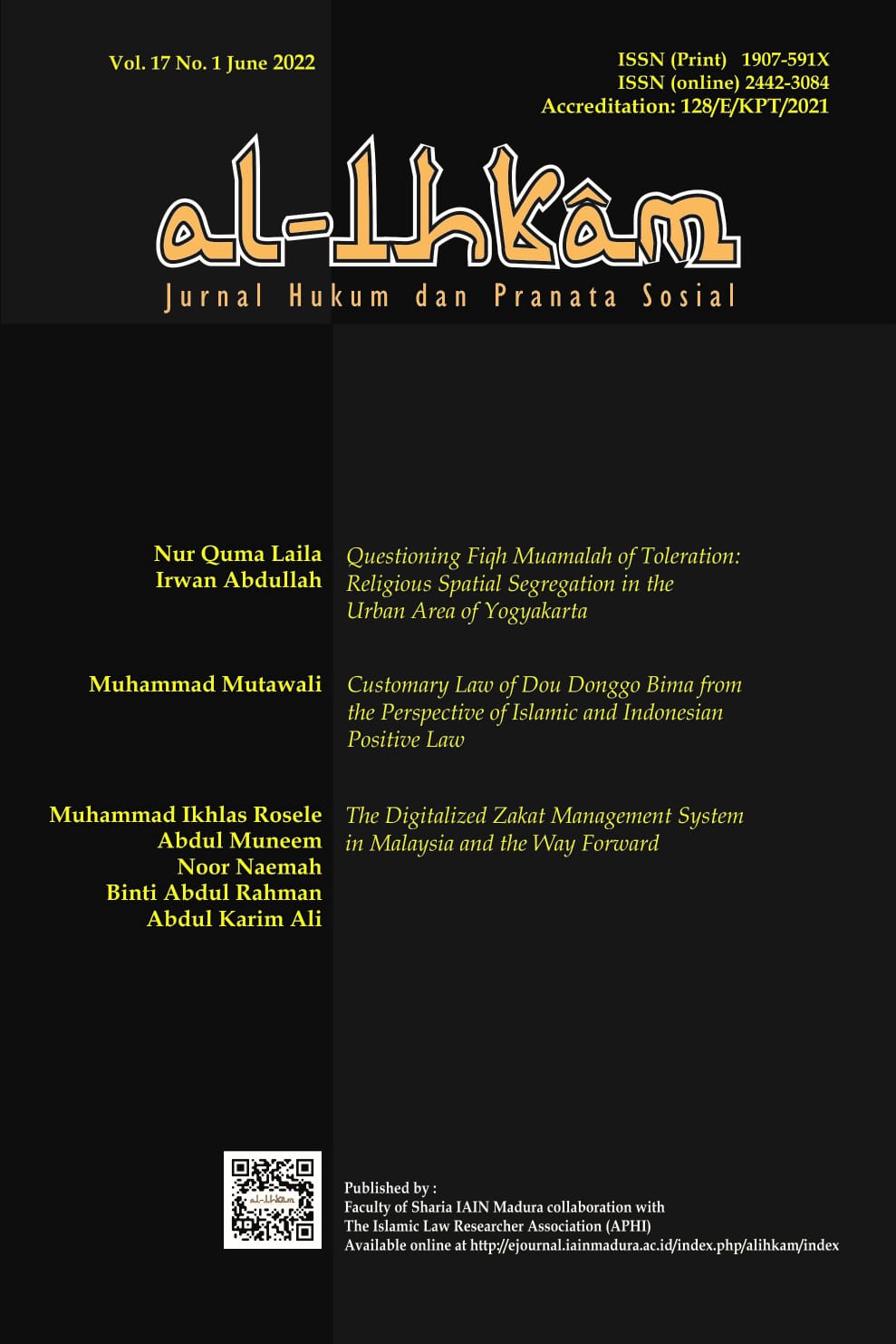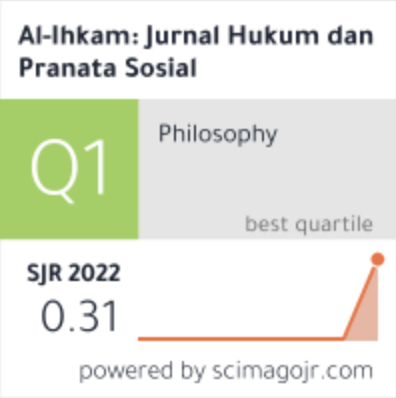Creating Family Resilience in Indonesia: A Study of “Marriage Guidance” Program in Aceh and South Sumatera
 Abstract views: 1071
,
Abstract views: 1071
,
 PDF downloads: 720
PDF downloads: 720
Abstract
Indonesia still experiences the increasing of divorce rates. To address this issue, the government through the Ministry of Religious Affairs has carried out several strategic programs, including Bimbingan Perkawinan (Marriage Guidance). The study of this paper examines the influence of the program on family resilience in the provinces of Aceh and South Sumatra. It used the normative approach in sociological studies. Data were collected by means of interviews, document studies, and questionnaires. The results of the study by referring to the questionnaire and interview show that the program in Aceh and South Sumatra has been running well. However, it has not been able to create family resilience and the divorce rate still keeps increasing. It is expected that post-marriage counseling should also be conducted so that married couples can establish family resilience as aspired within the community and country.
Downloads
References
Abubakar, Fatum. “Islamic Family Law Reform: Early Marriage and Criminalization (A Comparative Study of Legal Law in Indonesia and Pakistan.” Ahkam: Jurnal Syari’ah Dan Hukum 4, no. 2 (2019): 97–118.
Amalia, Rizqi Maulida, M. Yudi Ali Akbar, and Syariful. “Ketahanan Keluarga Dan Kontribusinya Bagi Penanggulangan Faktor Terjadinya Perceraian.” Jurnal Al-Azhar Indonesia Seri Humaniora 4, no. 2 (2017): 134.
Anam, Ahmad Khoirul. “Penerapan Hukum Keluarga Muslim Di Asia Tenggara: Sebuah Perbandingan.” Jurnal Bimas Islam 10, no. 1 (2017): 129–45.
Barnadib, Imam. Pemikiran Tentang Pendidikan Baru. Yogyakarta: Andi Offset, 1983.
Bowen, John R. Islam, Law, and Equality in Indonesia: An Anthropology of Public Reasoning. Cambridge: University Press, 2003.
Büchler, Andrea, and Eveline Schneider Kayasseh. “Fostering and Adoption in Islamic Law-Under Consideration of the Laws of Marocco, Egypt and the United Arab Emirates.” Electronic Journal of Islamic and Middle Eastern Law (EJIMEL) 6 (2018): 31. http//www.ejimel.uzh.ch. .
Cammack, Mark, and et.al. “An Empirical Assesment of Divorce Law in Indonesia.” Studia Islamika 4, no. 4 (1997): 93–108.
Djawas, Mursyid, and et.al. “The Government’s Role in Decreasing Divorce Rates in Indonesia: The Case of Aceh and South Sulawesi.” Ahkam: Jurnal Ilmu Syariah 21, no. 1 (2021): 163–88.
Djawas, Mursyid, and Sri Astuti A Samad. “Conflict, Tradition and Family Resistance: The Pattern of Dispute Resolution in Acehnese Community According to Islamic Law.” Samarah: Jurnal Hukum Keluarga Dan Hukum Islam 4, no. 1 (2020): 65–84.
Dzulfaroh, Ahmad Naufal. “10 Daerah Dengan Angka Perceraian Tertinggi Di Indonesia”, in Https://Www.Kompas.Com/Tren/Read/2022/03/09/062500765/10-Daerah-Dengan-Angka-Perceraian-Tertinggi-Di-Indonesia?Page=all, Accessed on May 22, 2022.,” n.d.
Fuady, Munir. Metode Riset Hukum: Pendekatan Teori Dan Konsep. Jakarta: Rajawali Press, 2018.
———. Teori-Teori Besar (Grand Theory) Dalam Hukum. Jakarta: Kencana, 2020.
Hariyanto, Erie, Maimun, and Ainurrahman Hidayat. “Pencapaian Keluarga Sakinah Melalui Pemberdayaan Ekonomi Di Desa Buddagan Kecamatan Pademawu.” Pêrdikan: Journal of Comminuty Engagement 2, no. 1 (2020): 1–9.
Hooker, MB. “Southeast Asian Sharī’ahs.” Studia Islamika 20, no. 2 (2013): 206–8.
HS, Salim, and Erlies Septianan Nurbani. Penerapan Teori Hukum Pada Penelitian Disertasi Dan Tesis (Buku Kedua). Jakarta: Rajawali Persada, 2017.
Ibrahim, Muslim, and Muhammad Safiq Imran bin Samsudin. “Prosedur Poligami Di Malaysia (Analisis Undang-Undang Keluarga Islam Wilayah Persekutuan).” Samarah: Jurnal Hukum Keluarga Dan Hukum Islam 2, no. 1 (2018): 1–26.
JND, Anderson. Islamic Law in Modern World. London: Oxford University Press, 1959.
Khairuddin. Sosiologi Keluarga. Yogyakarta: Nur Cahaya, 1985.
M. Jakfar, Tarmizi, and Nur Azizah Fayyadhah Binti Baharuddin. “Peran Majelis Sulh Dalam Penyelesaian Hak Hadhanah Pasca Perceraian (Studi Kasus Mahkamah Syariah Kabupaten Tawau, Provinsi Sabah, Negara Malaysia).” Samarah: Jurnal Hukum Keluarga Dan Hukum Islam 2, no. 1 (2018): 195–125.
Mahmood, Tahir. Family Law Reform in The Muslim World. Bombay: Tripathi PVD LTD, 1972.
Maimun, and et.al. “The Development of Fiqh Munakahat Ini Madurese Islamic Universities and Its Relation to Gender Equality and Divorce Prevention.” Al-Ihkam: Jurnal Hukum Dan Pranata Sosial 15, no. 2 (2020): 279–300. https://doi.org/. https://doi.org/10.19105/al-lhkam.v15i2.2734.
Ministry of Women’s Empowerment and Child Protection. “Pembangunan Ketahanan Keluarga.” Jakarta, 2016.
Muhlis, Achmad, Muhammad Holis, Saliha Sebgag, and Moh. Wardi. “Students’ Destructive Behavior Towards The Teacher in The Teaching and Learning Process.” Cendekia: Jurnal Kependidikan Dan Kemasyarakatan 1, no. 1 (2021): 21–46. https://doi.org/10.21154/cendekia.v1i1.2392.
Nasution, Khoiruddin. “Peran Kursus Nikah Membangun Keluarga Sejahtera.” Ahkam: Jurnal Ilmu Syariah 15, no. 2 (2015): 183.
Printo, and Erman. Dasar-Dasar Bimbingan Dan Konseling. Jakarta: Rineka Cipta, 1999.
Qatrunnada, Munawwarah, Munawwarah Nur Rofiah, and I. Abdul Qadir, F., & Muzayyanah. “Modul Bimbingan Perkawinan Untuk Calon Pengantin.” Jakarta, 2017.
Rahardjo, Satjipto. Hukum Dan Masyarakat. Bandung: Angkasa, 1980.
Salim, Arskal. Contemporary Islamic Law in Indonesia: Sharia and Legal Pluralism. Edindurgh UK: Edinburgh University Press, 2015.
Samad, Sri Astuti A. “Kajian Hukum Keluarga Islam Dalam Perspektif Sosiologis Di Indonesia.” El-Usrah: Jurnal Hukum Keluarga 4, no. 1 (2021): 138–52.
Sanusi, Nur Taufiq. “Diversity in Muslim State Legislation (Comparative Study of Islamic Family Law Pakistan, Egypt and Indonesia).” Jurnal Al-Qadau 4, no. 2 (2017): 331–34.
Saridewi, Valentina Siwi, Armaidy Armawi, and Djoko Soerjo. “Penggunaan Teknologi Informasi Komunikasi Dalam Manajemen Asi Bagi Ibu Bekerja Guna Menjaga Ketahanan Keluarga (Studi Anggota Grup Facebook Asosiasi Ibu Menyusui Indonesia).” Jurnal Ketahanan Nasional 22, no. 1 (2016): 76–93.
Sury, Khalis. “Angka Perceraian Di Aceh Capai 6 Ribu Lebih Pada 2020, Www.Antaranews.Com, Accessed on May 22, 2022.,” n.d.
Syarifuddin, Amir. Hukum Perkawinan Di Indonesia. Jakarta: Kencana, 2011.
Wardi, M., I. Ismail, Z. Zainollah, and I.S. Wekke. “Entrepreneurship and Financing in Islamic Educational Institution of Darul Ulum Banyuanyar Pamekasan.” Academy of Entrepreneurship Journal 25, no. Special Issue 2 (2019).
Wardi, Moh., and Ismail Ismail. “Following The Prophet Muhammad Character Through Ngabuleh Tradition in Pondok Pesantren Darul Ulum Banyuanyar Pamekasan.” EL HARAKAH (TERAKREDITASI) 20, no. 1 (June 1, 2018): 49. https://doi.org/10.18860/el.v20i1.4473.
Copyright (c) 2022 AL-IHKAM: Jurnal Hukum & Pranata Sosial

This work is licensed under a Creative Commons Attribution-ShareAlike 4.0 International License.
In order to be accepted and published by Al-Ihkam: Jurnal Hukum dan Pranata Sosial, author(s) submitting the article manuscript should complete all the review stages. By submitting the manuscript, the author(s) agreed to the following terms:
- The copyright of received articles shall be assigned to Al-Ihkam: Jurnal Hukum dan Pranata Sosial as the publisher of the journal. The intended copyright includes the right to publish articles in various forms (including reprints). Al-Ihkam: Jurnal Hukum dan Pranata Sosial maintain the publishing rights to the published articles.
- Authors are permitted to disseminate published articles by sharing the link/DOI of the article at Al-Ihkam: Jurnal Hukum dan Pranata Sosial. Authors are allowed to use their articles for any legal purposes deemed necessary without written permission from Al-Ihkam: Jurnal Hukum dan Pranata Sosial with an acknowledgment of initial publication to this journal.
- Users/public use of this website will be licensed to CC-BY-SA.



.png)
_1.png)










